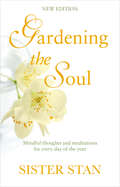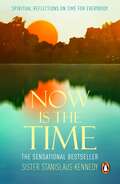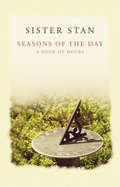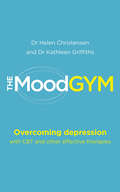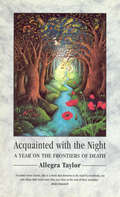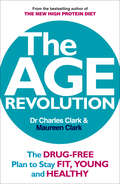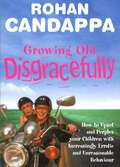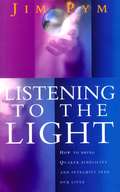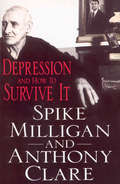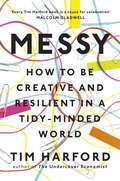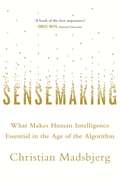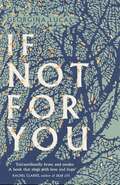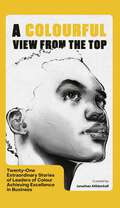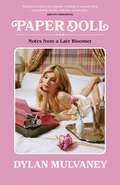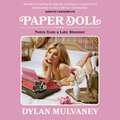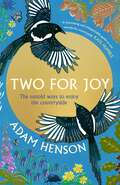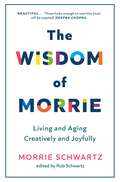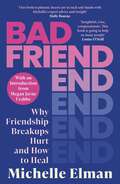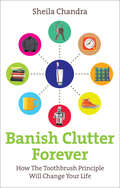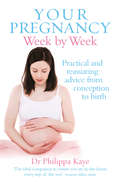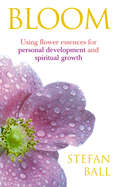- Table View
- List View
Gardening The Soul: Mindful Thoughts and Meditations for Every Day of the Year
by Stanislaus KennedySister Stan, as she is affectionately known, was brought up on a farm in Dingle, County Kerry, one of the most beautiful parts of Ireland. It was there that she learnt to appreciate the earth, its stillness and its energy, its beauty and its bounty.In this hugely powerful and evocative book, Sister Stan looks to the earth that is so precious to our existence for inspiration throughout the year. Reflecting the garden's changing rhythms through the seasons, Gardening the Soul offers us a daily thought to keep us going as we face the challenges of modern life.All our moods are covered here... * in January, when there is silence in the garden, she looks at Solitude in our soul...* in March, with emergence in the garden, she offers Hope...* in August, when there is fullness and abundance everywhere, there is Blessing, and* in October, the time of harvest, there is Harmony Comforting and insightful, Gardening the Soul is an inspirational daybook of lessons gleaned from the wisdom of nature.
Now is the Time: the phenomenal instant bestseller perfect for anyone searching for a deeper meaning to life
by Stanislaus Kennedy"Take time to live - it's what life is for."This is an inspiring and thought-provoking work of vision from multi-bestseller Sister Stanislaus Kennedy. A timely and prescient collection of thoughts and reflections, with one central message: we have the time, if we make the choice to take time...'Even the most convinced cynics will find something in Sister Stan's basic premise' -- Ireland on Sunday'Very beautifully written' -- ***** Reader review'A book I want to read & reread in order to plumb its depths' -- ***** Reader review*************************************************************SPIRITUAL REFLECTIONS ON TIME FOR EVERYBODYNow is the Time looks beyond the boundaries of any one faith or church and draws on the great spiritual and philosophical traditions of east and west.As Sister Stan focuses on a line of poetry from one of the world's great authors, an idea from a psychotherapist or philosopher, or a proverb from oriental wisdom, she weaves her own thoughts around them in a way that presents them afresh, and allows us to see them from a new perspective.This is book for everyone battling with today's current climate: young or old, male or female, for the converted, the irreligious or plain disaffected.Reflective, contemplative and spiritual, it is the perfect tonic to our busy and relentless world...
Seasons of the Day
by Stanislaus KennedyBased on the traditional Book of Hours - psalms said daily, at set times, by religious communities throughout the world - Seasons of the Day reveals the enduring relevance of this ancient practice to contemporary living.In Seasons of the Day, Sister Stan, knowing that our modern-day understanding of time pushes us to our stressed-out limits, passes on the monastic ritual to the layperson.Here, as she slows us down, she reveals the psalms through her own words, her own prayers. Using them, she also guides us tenderly through a four-week period, from the silence and mystery of pre-dawn (matins) through to the reflective conclusion of the day (compline). In a world that can often seem hostile and unfriendly, her gentle reflections help the reader find inner peace and confidence.A prayer book for today
The Mood Gym: Overcoming depression with CBT and other effective therapies
by Dr Kathleen Griffiths Dr Helen ChristensenAll of us feel anxious from time to time, but for one in six people in the UK chronic depression can become unbearable and severely disrupt everyday life. The Mood Gym is an interactive programme designed for those who would like to manage existing negative emotions and prevent mental health problems in the future.Drawing on the latest research and based on two proven techniques - Cognitive Behaviour Therapy and Interpersonal Therapy - this unique guide will:- assess your mood and anxiety levels through interactive quizzes- help you to change unhelpful patterns of thought and behaviour- offer proven coping strategies to help you deal with depression and let you enjoy your life once more- outline complementary therapies, such as relaxation and meditation, to assist you in your recoveryThe Mood Gym is a unique guide that will help you feel better.
Acquainted With The Night: A Year on the Frontiers of Death
by Allegra TaylorDeath is the most predictable thing that will happen to any of us and one of the few experiences we share with every other human being, yet we hardly give it a thought. Most of us behave as if pretending it didn't exist gives is a measure of control over it. The traditional supports that used to cradle us in times of need are no longer there.Acquainted with the Night is the story of Allegra Taylor's year spent working in a hospice and training to become part of London Lighthouse, the support network for people with AIDS.Accessible, anecdotal and warmly personal, this is an important book. For it shows us that death is not the enemy; that it is possible to 'be there' for someone who is dying or bereaved, to grieve well in the face of death and, when the time comes, to die well ourselves.
The Age Revolution: The drug-free plan to stay fit, young and healthy
by Maureen Clark Dr Charles ClarkCombat the effects of ageing and live a fuller, healthier life.Getting older may be inevitable, but your body doesn't have to show the signs of age. This revolutionary health book from bestselling author Dr Charles Clark, reveals how you can slow - or even reverse - the process of ageing.Using medically proven techniques for progamming your body to work for you, rather than against you, he neutralises every age-related health concern.Improve your health and reduce requirement for medicationLower cholesterol and blood pressureProtect yourself from arthritis, cardiovascular disease and heart diseaseControl or reverse diabetesLook younger, prevent premature ageing and feel energised
Growing Old Disgracefully: How to upset and perplex your children with increasingly erratic and unreasonable behaviour
by Rohan CandappaDoes your mother think it's really charming to talk to every rose bush on the street? Has your father taken up obsessive fundraising for a donkey sanctuary on retirement? Does he collect elastic bands because 'you never know when you'll need one'? Do your parents make jokes about sheltered housing? Have they guessed that you've already sent off for the brochures? Do they seem to be having too much fun for a couple with two fake hips, a pacemaker and three steel pins between them? Then you need Rohan Candappa. The man who bought you The Little Book of Stress, The Little Book of Wrong Shui and The Autobiography of a One Year Old has hit the nail on the head once more. Full of wit and wisdom, Rohan will give you a much needed laugh in the face of your parents' increasingly barmy behaviour. Just one thing, you'll probably find your parents have bought it too. And they'll probably think its really funny.
Listening To The Light
by Jim PymQuakers have long been respected for their simplicity, integrity, truthfulness, non violence and undestanding of the need for silence. This inspirational little book explores Quaker values and shows how - even if we are not members of the Society of Friends - we can bring Quaker practices and ideals into our everyday lives and relationships with others. Including a fascinating chapter on how to use the tools of Quakerism in a business context, there is also much helpful advice on how to slow down, still the mind and 'let the heart create for us'.
Depression And How To Survive It
by Spike Milligan Professor Anthony Clare'Anyone worried about a depressed friend or relative should read this book'DAILY TELEGRAPH_________________________________________________ In 1982, leading psychiatrist and TV presenter Anthony Clare interviewed Spike Milligan for the radio series In The Psychiatrist's Chair. He was so overwhelmed by Milligan's account of his forty years of depressive experiences that he knew he had found the right person to help him illuminate and explore the mysterious and sometimes terrifying condition that is clinical depression. Depression and How to Survive It charts the development of world-famous comedian Spike Milligan's clinical depression and the strategies he used in dealing with the often-misunderstood disorder.Drawing inspiration and advice from Spike's experience, this unique book from one of Britain's most successful psychiatrists, will take you to the depths of human unhappiness and show you the way towards leading a happy life.
Messy: How to Be Creative and Resilient in a Tidy-Minded World
by Tim Harford'Ranging expertly across business, politics and the arts, Tim Harford makes a compelling case for the creative benefits of disorganization, improvisation and confusion. His liberating message: you'll be more successful if you stop struggling so hard to plan or control your success. Messy is a deeply researched, endlessly eye-opening adventure in the life-changing magic of not tidying up' Oliver BurkemanThe urge to tidiness seems to be rooted deep in the human psyche. Many of us feel threatened by anything that is vague, unplanned, scattered around or hard to describe. We find comfort in having a script to rely on, a system to follow, in being able to categorise and file away. We all benefit from tidy organisation - up to a point. A large library needs a reference system. Global trade needs the shipping container. Scientific collaboration needs measurement units. But the forces of tidiness have marched too far. Corporate middle managers and government bureaucrats have long tended to insist that everything must have a label, a number and a logical place in a logical system. Now that they are armed with computers and serial numbers, there is little to hold this tidy-mindedness in check. It's even spilling into our personal lives, as we corral our children into sanitised play areas or entrust our quest for love to the soulless algorithms of dating websites. Order is imposed when chaos would be more productive. Or if not chaos, then . . . messiness.The trouble with tidiness is that, in excess, it becomes rigid, fragile and sterile. In Messy, Tim Harford reveals how qualities we value more than ever - responsiveness, resilience and creativity - simply cannot be disentangled from the messy soil that produces them. This, then, is a book about the benefits of being messy: messy in our private lives; messy in the office, with piles of paper on the desk and unread spreadsheets; messy in the recording studio, the laboratory or in preparing for an important presentation; and messy in our approach to business, politics and economics, leaving things vague, diverse and uncomfortably made-up-on-the-spot. It's time to rediscover the benefits of a little mess.
Sensemaking: What Makes Human Intelligence Essential in the Age of the Algorithm
by Christian MadsbjergA FINANCIAL TIMES BUSINESS BOOK OF THE MONTH (APRIL 2017)Humans have become subservient to algorithms. Every day brings a new Moneyball fix - a maths whiz who will crack open an industry with clean fact-based analysis rather than human intuition and experience. As a result, we have stopped thinking. Machines do it for us. Christian Madsbjerg argues that our fixation with data often masks stunning deficiencies, and the risks for humankind are enormous. Blind devotion to number crunching imperils our businesses, our educations, our governments, and our life savings. Too many companies have lost touch with the humanity of their customers, while marginalising workers with arts-based skills. Contrary to popular thinking, Madsbjerg shows how many of today's biggest success stories stem not from 'quant' thinking but from deep, nuanced engagement with culture, language, and history. He calls his method sensemaking. In this landmark book, Madsbjerg lays out five principles for how business leaders, entrepreneurs, and individuals can use it to solve their thorniest problems. He profiles companies using sensemaking to connect with new customers, and takes readers inside the work process of sensemaking 'connoisseurs' like investor George Soros, architect Bjarke Ingels, and others. Both practical and philosophical, Sensemaking is a powerful rejoinder to corporate groupthink and an indispensable resource for leaders and innovators who want to stand out from the pack.
If Not For You: A Memoir (Georgina Lucas)
by Georgina Lucas'If I were to look closely at the jagged edges of my fragmented heart, I'm sure I'd see that some spaces now shine with gold. And that is what he left for me.'_______________________'An extraordinarily brave, honest and tender book' RACHEL CLARKE'Full of strength and hope' KATE MOSSE'The most beautiful thing I have ever read' TOM BRADBY'Extraordinary' ANITA RANI, WOMAN'S HOUROn the 17th November 2019, Grey Atticus Fox was born, nine weeks early, to Georgie and Mike in a Kent hospital.Heart wrenching, cathartic, life-affirming, this is her account of the 21 days they had together, and its aftermath - the search to make sense of unimaginable loss. It bears witness to both the confusion and the clarity that accompany great pain, and stands as a testament to empathy, care and humanity when life is at its hardest.'He was looked after by strangers who became family, and he saw more kindness, more love, in twenty-one days than some might see in a lifetime. For his brief moments in this world, he experienced all of the very best things it can offer.'Georgie's spare, intimate and at times surprisingly comic writing offers an extraordinary message of hope. If Not For You is about the redeeming power of love, even in our darkest hour.'I cannot stop thinking about it' LUCY FOLEY'An unflinching and beautiful book' SOPHIE KINSELLA'Georgie Lucas writes superbly' MIRIAM STOPPARD
A Colourful View From the Top: Twenty-One Extraordinary Voices of Black and Brown Excellence in Business
by Jonathan Mildenhall'Much needed inspiration for those working hard to reach a position that matches their potential and their allies' Ally Owen, Founder of Brixton Finishing SchoolYou might not think, right now, that you have what it takes to succeed. But incredible things do happen when you believe. We hope this book will stoke your sense of belief in what it is you can achieve and the gifts you have the potential to give to the world.Relentless in its inspiration, candour and warmth, A Colourful View From the Top is a vital anthology of twenty-one voices who are at the top of their game in business and beyond. Whether their specialism be advertising, tech, law or art, each luminary offers a unique and deeply meaningful collection of lessons and affirmations to draw upon time and time again.Discover how they became influential figures in culture and corporate life; how their achievements haven't been defined or limited by their race, gender or age; how sometimes the most fulfilling careers involve twists, turns and side hustles; how corporate success need not preclude social awareness.For too long, we have needed a more diverse set of commercial and cultural leaders to champion. Now it's time to hear their voices. Essential and engaging, A Colourful View From the Top is a deeply necessary compendium of varied experiences and career paths, candidly told by those who lived them.
A Colourful View From the Top: Twenty-One Extraordinary Stories of Excellence in Business by Leaders of Colour
by Jonathan Mildenhall'Much needed inspiration for those working hard to reach a position that matches their potential and their allies' Ally Owen, Founder of Brixton Finishing SchoolYou might not think, right now, that you have what it takes to succeed. But incredible things do happen when you believe. We hope this book will stoke your sense of belief in what it is you can achieve and the gifts you have the potential to give to the world.Relentless in its inspiration, candour and warmth, A Colourful View From the Top is a vital anthology of twenty-one voices who are at the top of their game in business and beyond. Whether their specialism be advertising, tech, law or art, each luminary offers a unique and deeply meaningful collection of lessons and affirmations to draw upon time and time again.Discover how they became influential figures in culture and corporate life; how their achievements haven't been defined or limited by their race, gender or age; how sometimes the most fulfilling careers involve twists, turns and side hustles; how corporate success need not preclude social awareness.For too long, we have needed a more diverse set of commercial and cultural leaders to champion. Now it's time to hear their voices. Essential and engaging, A Colourful View From the Top is a deeply necessary compendium of varied experiences and career paths, candidly told by those who lived them.
Paper Doll: Notes From A Late Bloomer
by Dylan MulvaneyWhen Dylan Mulvaney came out as a woman online, she was a viral sensation almost overnight, emerging as a trailblazing voice on social media. Dylan's personal coming-out story blossomed into a platform for advocacy and empowerment for trans people all over the world. <p> Through her "Days of Girlhood" series, she connected with followers by exploring what it means to be a girl, from experimenting with makeup to story times to spilling the tea about laser hair removal, while never shying away from discussing the transphobia she faced online. Nevertheless, she was determined to be a beacon of positivity. But shortly after she celebrated day 365 of being a girl, it all came screeching to a halt when an innocuous post sparked a media firestorm and right-wing backlash she couldn't have expected. <p> Despite the vitriolic press and relentless paparazzi, Dylan was determined to remain loud and proud. In Paper Doll: Notes from a Late Bloomer, Dylan pulls back the curtain of her "It Girl" lifestyle with a witty and intimate reflection of her life pre- and post-transition. She covers everything from her first big break in theatre to the first time her dad recognized her as a girl to how she handled scandals, cancellations, and . . . tucking. It's both laugh-out-loud funny and powerfully honest-and is a love letter to everyone who stands up for queer joy. <b>New York Times Bestseller</b>
Paper Doll: Notes From A Late Bloomer
by Dylan Mulvaney'AN ESSENTIAL READ FOR ANYONE WITH A HEART' JOE LOCKE, star of Heartstopper'SHOULD BE REQUIRED READING FOR ANYONE LOOKING TO EXPAND THEIR RELATIONSHIP TO THE LGBTQ+ COMMUNITY' Kristin Chenoweth'DYLAN MAKES ME LAUGH AND MAKES ME BRAVE. I LOVE PAPER DOLL AND I LOVE THIS WOMAN' Glennon Doyle, #1 Sunday Times bestselling author of UntamedWhen Dylan Mulvaney came out as a woman online, she was a viral sensation almost overnight, emerging as a trailblazing voice on social media. Dylan's personal coming-out story blossomed into a platform for advocacy and empowerment for trans people all over the world.Through her "Days of Girlhood" series, she connected with followers by exploring what it means to be a girl, from experimenting with makeup to story times to spilling the tea about laser hair removal, while never shying away from discussing the transphobia she faced online. Nevertheless, she was determined to be a beacon of positivity.But shortly after she celebrated day 365 of being a girl, it all came screeching to a halt when an innocuous post sparked a media firestorm and right-wing backlash she couldn't have expected. Despite the vitriolic press and relentless paparazzi, Dylan was determined to remain loud and proud.In Paper Doll: Notes from a Late Bloomer, Dylan pulls back the curtain of her "It Girl" lifestyle with a witty and intimate reflection of her life pre- and post-transition. She covers everything from her first big break in theatre to the first time her dad recognized her as a girl to how she handled scandals, cancellations, and . . . tucking. It's both laugh-out-loud funny and powerfully honest-and is a love letter to everyone who stands up for queer joy.
Two for Joy: The untold ways to enjoy the countryside
by Adam Henson"I share Adam's love of farming and wildlife and I found this to be a fascinating and indispensable guide to our wonderful countryside. Makes you excited to get outside and explore" - Kate Humble Ever wondered why the dawn chorus is so loud in spring? What makes a summer sunset so special? Where to spot a murmuration of starlings in autumn? Or how to identify trees from just their bark in winter? In Two for Joy, Adam Henson - much-loved and long-standing presenter of Countryfile - goes on a journey throughout each season to help you to find new and varied ways to reconnect to the British and Irish countryside. Discover what's happening on farms, growing in hedgerows, the stories behind countryside superstitions, how to revive lost traditions, what you might spot when you look up at the sky and stars - and plenty more in this uplifting guide to the nature that surrounds us. Whether you read this book in the depths of winter in an armchair by the fire, or on a picnic rug in a field on a sunny day, it promises to open your eyes to the awe-inspiring powers of our uniquely British countryside in ways you've never noticed before.
Two for Joy: The untold ways to enjoy the countryside
by Adam Henson"I share Adam's love of farming and wildlife and I found this to be a fascinating and indispensable guide to our wonderful countryside. Makes you excited to get outside and explore" - Kate Humble Ever wondered why the dawn chorus is so loud in spring? What makes a summer sunset so special? Where to spot a murmuration of starlings in autumn? Or how to identify trees from just their bark in winter? In Two for Joy, Adam Henson - much-loved and long-standing presenter of Countryfile - goes on a journey throughout each season to help you to find new and varied ways to reconnect to the British and Irish countryside. Discover what's happening on farms, growing in hedgerows, the stories behind countryside superstitions, how to revive lost traditions, what you might spot when you look up at the sky and stars - and plenty more in this uplifting guide to the nature that surrounds us. Whether you read this book in the depths of winter in an armchair by the fire, or on a picnic rug in a field on a sunny day, it promises to open your eyes to the awe-inspiring powers of our uniquely British countryside in ways you've never noticed before.
The Wisdom of Morrie
by Morrie SchwartzWho am I really? What have I done? What is important and meaningful to me? What difference does it make that I have lived? What does it mean to be truly human, and where am I on that scale?Morrie Schwartz, the beloved subject of the classic, multimillion-copy number one bestseller Tuesdays with Morrie, explores these questions and many more in this profound, poetic and poignant masterpiece of living and aging joyfully and creatively. Later life can be filled with many challenges, but it can also be one of the most beautiful and rewarding passages in anyone's lifetime. Morrie draws on his experiences as a social psychologist, teacher, father, friend and sage to offer us a road map to navigate our futures.A great companion to Tuesdays with Morrie or the perfect introduction to Morrie's thoughtful philosophies, The Wisdom of Morrie is filled with empathic insights, stories, anecdotes and advice, told in Morrie's reassuring, calm and timeless voice. Let The Wisdom of Morrie be your guide in exploring deep questions of how to live and how to love.
Bad Friend: Why Friendship Breakups Hurt and How to Heal
by Michelle Elman'So many people need this book' HOLLY BOURNE'Insightful, wise, compassionate' LOUISE O'NEILL'This book is your new best friend' SOFIE HAGEN'Truly game-changing. A book we should ALL read' LOUISE PENTLANDSociety's message is loud and clear: romantic relationships matter more than friendship. But when we have an average of twenty-nine platonic relationships in our lifetime, compared to just seven-to-ten romantic relationships, why is the conversation on love far greater than friendship? Life coach and broadcaster Michelle Elman is determined to fix this.If the conversation on friendship is quiet, the one on friendship break-ups is non-existent. This is despite research showing that only six friendships stand the test of time, which means that the average person experiences the ending of twenty-three friendships. As someone who has gone through a dozen of them, Michelle began to think she was a Bad Friend.Have one too many friendship break-ups and people start questioning what's wrong with you. But what if you aren't the problem? What if the problem is how we think about friendship break-ups?Introducing Bad Friend, a ground-breaking masterclass in friendship that makes space for every conversation you have never been allowed to have. Bad Friend will make you question everything you've been taught about friendships, and removes the stigma from friendship break-ups. This is for you if you've ever been hurt by a friend and, most importantly, reassures you that you're categorically not a bad friend.'It's time for a new narrative around platonic love. I can think of no better person than Michelle to show us the way' MEGAN JAYNE CRABBE'Female friendships can be core of a healthy, happy, fulfilled life. Their complexities are so often overlooked, but not anymore. Michelle Elman has perfectly summarised their complicated importance. Bravo' ANNA WHITEHOUSE'The world would be a much better place if every woman read Bad Friend and learned to communicate as clearly and directly as Michelle teaches us to. A game-changer which made me feel a million times better about friendships that have gone wrong in the past, while arming me with the tools I need for the future' ELLIE MIDDLETON'The guide to friendship breakups we all so desperately need. We've needed this book for years - I'm so happy it finally exists!' SOFIE HAGEN'This book is a must-read for anyone who's ever questioned a friendship, felt the sting of outgrowing someone, or wondered how to be a better friend themselves' SHIVANI PAU'This is a long overdue conversation about friendship: the joys, the break ups, the frustrations, and the tricky points of conflict that we all navigate over the course of time' ABIGAIL MANN'Michelle's writing is my emergency contact - I always come away with pluck in my step and a plan of action' LEENA NORMS'Michelle's ability to share her wisdom with wit, honesty, and heart - whilst tackling subjects often untouched - is a testament to her generosity and fearless spirit. With a wicked sense of humour, confidence and an uncanny ability to connect with people at every level, Michelle is truly one of a kind' MICHELLE ZELLI'Michelle is the queen of boundaries' KATIE PIPER'One of the 50 most influential women in the UK' THE SUN
Bad Friend: Why Friendship Breakups Hurt and How to Heal
by Michelle Elman'So many people need this book' HOLLY BOURNE'Insightful, wise, compassionate' LOUISE O'NEILL'This book is your new best friend' SOFIE HAGEN'Truly game-changing. A book we should ALL read' LOUISE PENTLANDSociety's message is loud and clear: romantic relationships matter more than friendship. But when we have an average of twenty-nine platonic relationships in our lifetime, compared to just seven-to-ten romantic relationships, why is the conversation on love far greater than friendship? Life coach and broadcaster Michelle Elman is determined to fix this.If the conversation on friendship is quiet, the one on friendship break-ups is non-existent. This is despite research showing that only six friendships stand the test of time, which means that the average person experiences the ending of twenty-three friendships. As someone who has gone through a dozen of them, Michelle began to think she was a Bad Friend.Have one too many friendship break-ups and people start questioning what's wrong with you. But what if you aren't the problem? What if the problem is how we think about friendship break-ups?Introducing Bad Friend, a ground-breaking masterclass in friendship that makes space for every conversation you have never been allowed to have. Bad Friend will make you question everything you've been taught about friendships, and removes the stigma from friendship break-ups. This is for you if you've ever been hurt by a friend and, most importantly, reassures you that you're categorically not a bad friend.'It's time for a new narrative around platonic love. I can think of no better person than Michelle to show us the way' MEGAN JAYNE CRABBE'Female friendships can be core of a healthy, happy, fulfilled life. Their complexities are so often overlooked, but not anymore. Michelle Elman has perfectly summarised their complicated importance. Bravo' ANNA WHITEHOUSE'The world would be a much better place if every woman read Bad Friend and learned to communicate as clearly and directly as Michelle teaches us to. A game-changer which made me feel a million times better about friendships that have gone wrong in the past, while arming me with the tools I need for the future' ELLIE MIDDLETON'The guide to friendship breakups we all so desperately need. We've needed this book for years - I'm so happy it finally exists!' SOFIE HAGEN'This book is a must-read for anyone who's ever questioned a friendship, felt the sting of outgrowing someone, or wondered how to be a better friend themselves' SHIVANI PAU'This is a long overdue conversation about friendship: the joys, the break ups, the frustrations, and the tricky points of conflict that we all navigate over the course of time' ABIGAIL MANN'Michelle's writing is my emergency contact - I always come away with pluck in my step and a plan of action' LEENA NORMS'Michelle's ability to share her wisdom with wit, honesty, and heart - whilst tackling subjects often untouched - is a testament to her generosity and fearless spirit. With a wicked sense of humour, confidence and an uncanny ability to connect with people at every level, Michelle is truly one of a kind' MICHELLE ZELLI'Michelle is the queen of boundaries' KATIE PIPER'One of the 50 most influential women in the UK' THE SUN
Bad Friend: Why Friendship Breakups Hurt and How to Heal
by Michelle Elman'So many people need this book' HOLLY BOURNE'Insightful, wise, compassionate' LOUISE O'NEILL'This book is your new best friend' SOFIE HAGEN'Truly game-changing. A book we should ALL read' LOUISE PENTLANDSociety's message is loud and clear: romantic relationships matter more than friendship. But when we have an average of twenty-nine platonic relationships in our lifetime, compared to just seven-to-ten romantic relationships, why is the conversation on love far greater than friendship? Life coach and broadcaster Michelle Elman is determined to fix this.If the conversation on friendship is quiet, the one on friendship break-ups is non-existent. This is despite research showing that only six friendships stand the test of time, which means that the average person experiences the ending of twenty-three friendships. As someone who has gone through a dozen of them, Michelle began to think she was a Bad Friend.Have one too many friendship break-ups and people start questioning what's wrong with you. But what if you aren't the problem? What if the problem is how we think about friendship break-ups?Introducing Bad Friend, a ground-breaking masterclass in friendship that makes space for every conversation you have never been allowed to have. Bad Friend will make you question everything you've been taught about friendships, and removes the stigma from friendship break-ups. This is for you if you've ever been hurt by a friend and, most importantly, reassures you that you're categorically not a bad friend.'It's time for a new narrative around platonic love. I can think of no better person than Michelle to show us the way' MEGAN JAYNE CRABBE'Female friendships can be core of a healthy, happy, fulfilled life. Their complexities are so often overlooked, but not anymore. Michelle Elman has perfectly summarised their complicated importance. Bravo' ANNA WHITEHOUSE'The world would be a much better place if every woman read Bad Friend and learned to communicate as clearly and directly as Michelle teaches us to. A game-changer which made me feel a million times better about friendships that have gone wrong in the past, while arming me with the tools I need for the future' ELLIE MIDDLETON'The guide to friendship breakups we all so desperately need. We've needed this book for years - I'm so happy it finally exists!' SOFIE HAGEN'This book is a must-read for anyone who's ever questioned a friendship, felt the sting of outgrowing someone, or wondered how to be a better friend themselves' SHIVANI PAU'This is a long overdue conversation about friendship: the joys, the break ups, the frustrations, and the tricky points of conflict that we all navigate over the course of time' ABIGAIL MANN'Michelle's writing is my emergency contact - I always come away with pluck in my step and a plan of action' LEENA NORMS'Michelle's ability to share her wisdom with wit, honesty, and heart - whilst tackling subjects often untouched - is a testament to her generosity and fearless spirit. With a wicked sense of humour, confidence and an uncanny ability to connect with people at every level, Michelle is truly one of a kind' MICHELLE ZELLI'Michelle is the queen of boundaries' KATIE PIPER'One of the 50 most influential women in the UK' THE SUN
Banish Clutter Forever: How the Toothbrush Principle Will Change Your Life
by Sheila ChandraWhy is it that even the most disorganised person never seems to lose their toothbrush? How can this simple fact solve all our clutter problems?The Toothbrush Principle is a simple yet inspired approach to de-cluttering your home. Whether you live in a mansion or a bedsit, this book will show you how to: organise according to the unconscious blueprint that naturally tidy people have, so that getting and staying organised is easy; know what to throw away with confidence; set up your wardrobe so you get much more use out of the clothes you have; work from home productively in a clear, designated space; tame your inbox!Step-by-step, room-by-room, you'll soon find that you hardly ever lose things, massive clear outs become a thing of the past and you never spend more than 10 minutes a day tidying up.So stop drowning in piles of clutter, learn how to be organised and start creating space to live out the life of your dreams!
Your Pregnancy Week by Week: Practical and reassuring advice from conception to birth
by Dr Philippa KayeThe wonderful news of a new addition to the family will leave you and your loved ones eager to prepare for their arrival. However, it is you, with the support of your partner, who will experience your child's first nine months of development during pregnancy.Your Pregnancy Week by Week tells you everything you need to know about your pregnancy. On a week-by-week basis, you can learn how your baby is developing, how and why your body is changing and what you can do to ensure a smooth and comfortable pregnancy, every step of the way.With clear, authoritative advice that demystifies complex medical jargon, this indispensable guide takes you through each stage of pregnancy, addressing common concerns and questions to ensure a healthy start for your baby.
Bloom: Using flower essences for personal development and spiritual growth
by Stefan BallInsightful and engaging, Bloom explains how to use the Bach Flower Remedies for personal and spiritual growth. Written by a key team member at the Dr Edward Bach Centre, Bloom reveals how the Bach flower essences offer a complete system that can help us to change our lives for the better. Chapters 1-7 explore the ways in which the remedies relate to different life experiences, as well as intriguing schools of religious and philosophical belief. Interspersed with chapters 1-7, chapters i-vii look closely at the individual remedies in the system, explaining when to take each one and what they will do for you. Containing a wealth of personal stories, individual testimonies and fascinating anecdotes, Bloom has something to offer to anyone interested in the Bach Flower Remedies or drawn to personal development in general. Discover how to use the remedies to improve your own life and to grow into your full potential.
